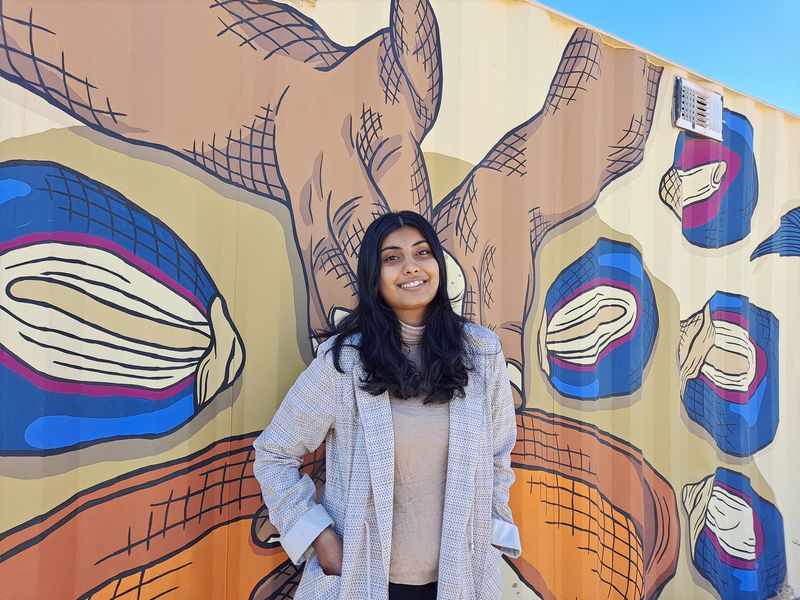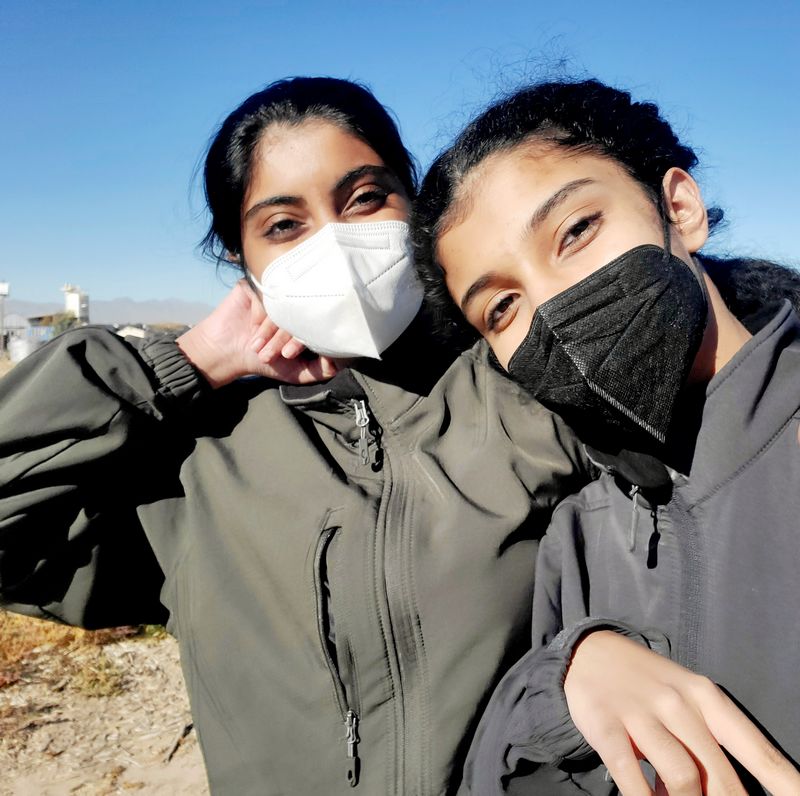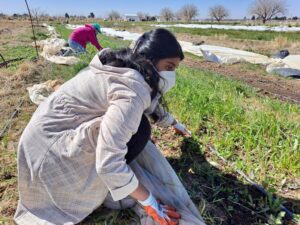Raíces Youth Feature: Lajward Zahra
Michelle E. Carreon, Food Justice Storyteller
As the Spring 2022 Raíces series is approaching the end of its 6-week program, the cohort will be graduating soon and learning some final lessons to carry forward.
We are taking a moment to highlight one of the youth participants, Lajward Zahra. This past February, the 17-year-old high school student published a visual and reflective portrait of La Semilla Community Farm and her experiences as a participant in the Fall 2021 Raíces series. You can read Lajward’s original article and view her photos of our farm in The City Magazine February 2022 issue here.
We wanted to follow up with Lajward and chat with her about her background and her second time around with Raíces, as well as how the program and La Semilla are playing a role in her present-day life and plans for the future.
Background & Family
Lajward was born in Karachi, Pakistan and moved to El Paso, Texas with her family when she was a child. She shared how her experiences immigrating to the U.S. has shaped her perspective about various dimensions of society. Describing Karachi as a “very diverse” city, Lajward noted similarities between the Pakistani metropolis and El Paso. Both are sites of “migratory activity.” On living on the border, she values seeing more indigenous roots and connections visible and discussed in El Paso.
Lajward is the oldest of four siblings and takes the responsibility of “beating down the path” for her three younger sisters seriously. During the Fall 2021 and Spring 2022 Raíces sessions, her younger sister, Aina Marzia, has also been an active youth participant. We’ve had the pleasure of joining the sisters for some of the Saturday sessions at our farm and have witnessed their support of each other and joking back and forth.
When speaking about her parents’ influence, Lajward shared their sense of humor and the importance of having funny parents to guide one’s development as a child. Her father is a geologist and named her after the dark blue stone (also known as Lapis Lazuli). Lajward recalls he would speak with her about Pakistani politics as a child, and she credits him for planting a seed of concern for social justice and social issues at such a young age. As a child, she wanted to be a doctor, but as she grew and developed more interest in public service and advocacy, she decided on human rights law as an avenue and long-term plan to help others.
When asked about her interests and hobbies, Lajward was not shy about sharing her many loves. She loves to write, talk, and read and recalls diving head first into the classics as a child, such as The Hunchback of Notre-Dame, The Three Musketeers, and more. She enjoys mixed-genre and dystopian fiction, speaks adoringly of Jane Austen, and has recently been reading more about the Great Partition of India to learn more about the history of her home country. Lajward enjoys writing poetry and longer fiction and has an affinity for journalism, which she calls a “brave profession.” She also enjoys painting, being out in nature, and biking. More and more her love of cooking is growing, and she describes the process as calming and “like being in a Studio Ghibli film.” Lajward also enjoys raised bed gardening and emphasizes this particular method to avoid coming in contact with worms. Those who have worked with Lajward at La Semilla Community Farm can attest to her aversion to the slimy creature. Despite acknowledging their significance for soil health, she’s happy to keep her distance!
On La Semilla & Raíces
This spring is the second series of Raíces that Lajward has participated in. She first learned about the youth program and La Semilla from a school counselor and decided to apply as she learned more about La Semilla’s work. While she grew up with a strong passion for justice and interest in social issues, including immigration and the U.S. legal system, she had never thought much about the food system and how it’s tied to so many facets of society. In learning about La Semilla, she shared that the organization’s work was closely aligned with her overall belief system and was an opportunity to learn more about topics that are not normally taught in the school system.
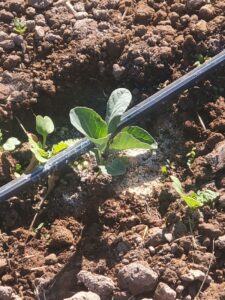
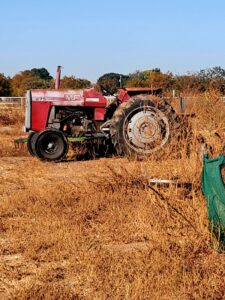
Photos taken at La Semilla Community Farm during the Fall 2021 Raíces series.
(By Lajward Zahra)
Throughout her tenure as a Raíces crew member, Lajward has shared a wide range of the topics she has learned about, including histories of colonization and its impact on ancestral foodways and traditions, water irrigation systems like the acequia system, cooking techniques (she’s very proud of her julienne skills with peppers), and documentaries about sustainability. She has even used what she’s learned for her school work, including a science class extra credit essay on sustainability.
In addition to the skills and knowledge base she’s acquired, Lajward has also gained a deeper understanding of the human dimension of the food system. Her experiences with Raíces have opened her eyes to thinking about the people who grow and pick the food we purchase in the grocery store and how farmworkers are not being compensated fairly for their labor. She is more conscious about these connections and mindful of the food choices she makes and the gratitude she feels with each plate. “We can’t live without food, but we aren’t eating in a sustainable way or a way that helps the people who literally farm our food…that’s going to be at the forefront of my mind when I go into advocacy and as a lawyer.”
Throughout her experiences as a Raíces member, Lajward has also witnessed compassion in action. She shared that watching the dynamic of the staff at La Semilla has had a lasting impact on her. She has witnessed a commitment to the land and a sense of purpose that aligns strongly with her own and serves as a model for doing what’s right by one another. “You can just feel it,” she says fondly of seeing the rapport and humor among staff who often seem like family with each other and set the tone for each session.
When asked what she would say to local youth who may be interested in applying for Raíces, Lajward does not mince words: “Do it…do it yesterday.” Acknowledging the level of stress many students face with school and other responsibilities, she emphasizes that Raíces is great for mental health, especially for teenagers. “To see a seed you planted grow is very satisfying,” she states while also stressing that in the process of farming “we are reliving our ancestors’ experiences” and feeling a deep sense of gratitude and joy in the practice. For Lajward, being at the farm is “literally a breath of fresh air…as soon as the mosquitoes are gone.”
In addition to improving youth’s knowledge about food justice and advocacy and cooking skills, she also notes that the experience provides an opportunity for youth to gain a deeper appreciation for all that goes into putting food on the table. It creates a deeper sense of empathy and connection with one’s community and with the land where we all live. She also is sure to stress two major benefits of joining Raíces: (1) “Ceci [Community Education Coordinator] brings you breakfast every Saturday, and it’s so good!” and (2) this is a paid opportunity. Raíces members receive a stipend that can go a long way and reflects the organization’s commitment to providing funding opportunities for future leaders in our community. Lajward stresses, “La Semilla is accessible, especially for my generation.”
Final Thoughts
When speaking about the influence La Semilla will have on her future, Lajward speaks passionately about the responsibility we all have to one another. She sees La Semilla as a shining example of folks answering the question of what we owe to each other. “We’ve only survived [as a human race], because we have been helping each other.” Carrying the lessons she’s learned from her time with Raíces, Lajward is mindful of how much she has left to learn and the role she can play in working with and in the service of others. During our conversation, she quoted Ukrainian-American Poet Ilya Kaminsky from his collection of poems, Deaf Republic:
“At the trial of God, we will ask: why did you allow all this?
And the answer will be an echo: why did you allow all this?”
She notes with some humor, “I want that to be my epitaph on my tombstone.”


